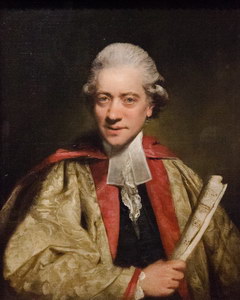



"John Milton" by Anon and "Charles Burney" by Joshua Reynolds, both to be found in the National Gallery in London.
Whilst in England on my trip there this year, I visited the grave of my 5th great grandfather: Dr Charles Burney, in the grounds of the Royal Chelsea Hospital. Charles Burney was a famous musicologist and a composer. On my return to Australia I set about discovering pieces of his music online and I found myself collaborating with my long dead ancestor on one of his songs.. You can read about my adventures in this matter on my blog here. To cut a long story short I wound up with a song entitled: "Mortals, learn your lives to measure." with words by John Milton, melody by Charles Burney and harmonisation by myself and Charles Burney.
As often happens with pieces of music, the work acquires a life of its own and grows far beyond what was originally envisaged. In this case the song asked to be arranged for SATB choir. Musically it was a bit of a challenge due to the complex harmony I had applied but not too difficult. I found though that it was necessary to break the voices into two pairs, one pair with a slower rhythm, so as to avoid a stolid hymn-like block harmony. This was fine but due to slower rhythm I found I needed different words...
As far as I can ascertain, the two original verses come from Comus as originally staged, a masque by Milton, written in 1634. They are in swung tempo with 8 syllables to the short line. But the couplets need to be read in pairs for the song, giving 16 syllables to the sung line. However, as was the fashion in those days Burney repeats each line in a different format so that effectively there are 32 syllables to each couplet in the song form (but not in Milton's). Here are Milton's verses:
Mortals, learn your lives to measure,
Not by length of time, but pleasure.
Now the hours invite, comply.
While you idly pause, they fly.
Blest, a nimble pace they keep,
But in torment, then they creep.
Mortals, learn your lives to measure,
Not by length of time, but pleasure.
Soon your spring must have a fall.
Losing youth is losing all.
Then you'll ask, but none will give,
And may linger, but not live.
To contrast with this rhythm and fit the song I needed a straight tempo where each syllable of the new poem corresponded to 2 syllables of the original. This required 8 syllables to the line and 16 syllables to the sung couplet. The meaning had to be the same. Essentially, because Burney doubled each couplet but I did not, I ended up writing verse of the same syllable count as the original although the rhythm was different.
In an unexpected but edifying sidelight, I found that it is almost impossible to write in straight time with accents on the first syllable, (trochaic tetrameter), even though this is what was required for the song, because then the final syllable in each line, which is the rhyming syllable, would not have the accent. When the rhyming syllable is not accented, the poem loses its swing. It is possible to do it with double syllable rhymes but those are much harder to work with and ultimately too limiting. Looking at Milton's words you can see the problem. He found the two syllable rhyme of measure-pleasure but could not find any others so he reverted to 1 syllable rhymes for the rest of his couplets. However, he steadfastly remained in trochaic form rather than switch to iambic form as I did. The result is that except for his measure-pleasure couplet all his other lines are only 7 syllables.
If you want to get full 8 syllable lines you have no real alternative but to start before the beat. This why most trochaic verse is not rhymed and why most straight rhythm poems are in iambic meter, in this case: iambic tetrameter
All in all it was an interesting task and it is fascinating to compare two poems with the same rhyming scheme and syllable count that say the same thing but have completely different words and a somewhat different feel.
Finally: Milton was a puritan and used the character of Comus, who is the son of Bacchus and the god of festivity, to show that bohemian revelry can only lead to ruin. That was his intention but in fact, he may have bested himself in this matter as there is a great deal of truth in these words uttered by Comus' revelers.
Life's worth is not how long it's run,
But rather all about the fun.
If pleasure you should chance upon,
Then seize it, for it soon is gone.
While entertained the hours flit,
Yet bored, it seems they never quit.
Life's worth is not how long it's run,
But rather all about the fun.
Too soon your youth is gone away,
And with it, all that's fine and gay.
Diversion then you'll seek in vain,
But never feel the zest again.
Warren Mars - December 2017